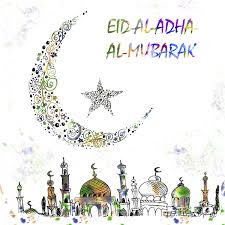Eid Al-Adha, also known as the Festival of Sacrifice, holds special significance for Muslims worldwide. Here are some essential etiquettes to observe on this auspicious occasion:
a. Ghusl (Ritual Bath) Before Eid Prayer
- It is recommended to perform ghusl (ritual purification) before heading to the Eid prayer. Just as we do before Jumu’ah (Friday) prayers, ghusl signifies spiritual readiness and cleanliness.
b. Eating Before Going to Eid Prayer
- On Eid al-Fitr, it’s Sunnah (Prophetic tradition) to eat some dates before going out for the prayer. This emphasizes the end of fasting during Ramadan.
- On Eid al-Adha, refrain from eating until after the prayer. If you’ve offered a sacrifice (udhiyah), you can break your fast with it.
c. Takbir (Magnification) on Eid
- Recite the Takbir (saying “Allahu Akbar” – Allah is the Most Great) aloud on Eid day. This is a significant Sunnah. Allah commands us to magnify Him for His guidance (Quran, al-Baqarah 2:185).
d. Offering Congratulations
- Greet fellow Muslims with “Eid Mubarak” or “Happy Eid.” Sharing joy and blessings is part of the celebration.
e. Adorning Oneself
- Dress modestly and elegantly in Islamic attire. Adorning oneself reflects the festive spirit and gratitude to Allah.
f. Taking Different Routes to and from the Prayer
- Follow the Sunnah by taking one route to the Eid prayer location and a different route back. This symbolizes unity and community engagement.
We offer one to one online Quran and Arabic classes for affordable fees, Enroll now and get your free trail class
2. Practices of Eid Ul-Adha
Eid Al-Adha commemorates Prophet Ibrahim’s willingness to sacrifice his son, Isma’il, in obedience to Allah’s command. Key practices include:
a. Udhiyah (Sacrifice)
- Muslims who can afford it offer a sacrificial animal (such as a sheep, goat, or cow) as an act of devotion. The meat is distributed among family, friends, and those in need.
b. Prayer and Sermon
- Attend the special Eid prayer (Salat al-Eid) in congregation. The imam delivers a sermon emphasizing sacrifice, faith, and gratitude.
c. Charity (Sadaqah)
- Give to charity during Eid. It’s a time to share blessings with others.
3. Rules for Eid Ul-adha
- Avoid fasting on Eid days (both Eid al-Fitr and Eid al-Adha).
- Perform the Eid prayer in congregation.
- Show kindness, forgiveness, and unity.
4. Ritual of Eid Al-Adha
- Wake up early, perform ghusl, and dress well.
- Offer the Eid prayer.
- Engage in acts of worship and remembrance.
5. Sunnah of Eid Ul-Adha
- Visit family and friends.
- Express gratitude to Allah for His blessings.
- Reflect on the story of Prophet Ibrahim and Isma’il.
6. How to Perform Ghusl for Eid
- Take a complete bath, ensuring that water reaches all parts of your body.
- Use a miswak (tooth-stick) for oral hygiene.
- Dress in clean, modest clothes.
Remember, Eid Ul-Adha is a time of joy, gratitude, and community. May your celebrations be blessed!
Feel free to ask if you need further information or clarification!

